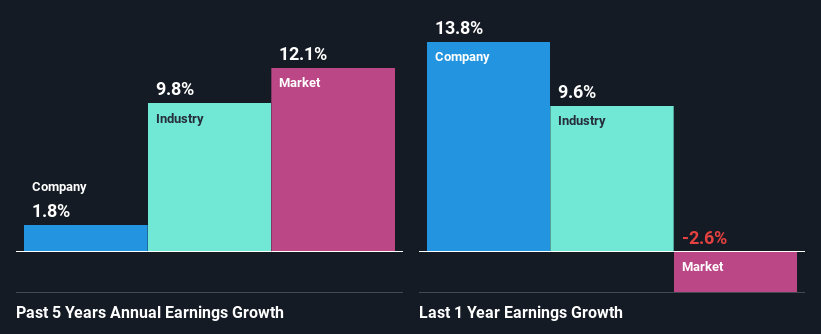Stock Analysis
- Germany
- /
- Personal Products
- /
- XTRA:BEI
Beiersdorf Aktiengesellschaft's (ETR:BEI) Stock Is Going Strong: Have Financials A Role To Play?

Most readers would already be aware that Beiersdorf's (ETR:BEI) stock increased significantly by 11% over the past three months. Given that stock prices are usually aligned with a company's financial performance in the long-term, we decided to study its financial indicators more closely to see if they had a hand to play in the recent price move. Particularly, we will be paying attention to Beiersdorf's ROE today.
ROE or return on equity is a useful tool to assess how effectively a company can generate returns on the investment it received from its shareholders. Simply put, it is used to assess the profitability of a company in relation to its equity capital.
See our latest analysis for Beiersdorf
How To Calculate Return On Equity?
The formula for ROE is:
Return on Equity = Net Profit (from continuing operations) ÷ Shareholders' Equity
So, based on the above formula, the ROE for Beiersdorf is:
10% = €855m ÷ €8.2b (Based on the trailing twelve months to June 2023).
The 'return' refers to a company's earnings over the last year. Another way to think of that is that for every €1 worth of equity, the company was able to earn €0.10 in profit.
Why Is ROE Important For Earnings Growth?
Thus far, we have learned that ROE measures how efficiently a company is generating its profits. Based on how much of its profits the company chooses to reinvest or "retain", we are then able to evaluate a company's future ability to generate profits. Assuming everything else remains unchanged, the higher the ROE and profit retention, the higher the growth rate of a company compared to companies that don't necessarily bear these characteristics.
A Side By Side comparison of Beiersdorf's Earnings Growth And 10% ROE
At first glance, Beiersdorf seems to have a decent ROE. And on comparing with the industry, we found that the the average industry ROE is similar at 11%. Given the circumstances, we can't help but wonder why Beiersdorf saw little to no growth in the past five years. Based on this, we feel that there might be other reasons which haven't been discussed so far in this article that could be hampering the company's growth. These include low earnings retention or poor allocation of capital.
Next, on comparing with the industry net income growth, we found that Beiersdorf's reported growth was lower than the industry growth of 9.8% over the last few years, which is not something we like to see.

The basis for attaching value to a company is, to a great extent, tied to its earnings growth. It’s important for an investor to know whether the market has priced in the company's expected earnings growth (or decline). Doing so will help them establish if the stock's future looks promising or ominous. If you're wondering about Beiersdorf's's valuation, check out this gauge of its price-to-earnings ratio, as compared to its industry.
Is Beiersdorf Efficiently Re-investing Its Profits?
Beiersdorf's low three-year median payout ratio of 24%, (meaning the company retains76% of profits) should mean that the company is retaining most of its earnings and consequently, should see higher growth than it has reported.
Moreover, Beiersdorf has been paying dividends for at least ten years or more suggesting that management must have perceived that the shareholders prefer dividends over earnings growth. Upon studying the latest analysts' consensus data, we found that the company's future payout ratio is expected to drop to 14% over the next three years. Regardless, the ROE is not expected to change much for the company despite the lower expected payout ratio.
Summary
In total, it does look like Beiersdorf has some positive aspects to its business. Yet, the low earnings growth is a bit concerning, especially given that the company has a high rate of return and is reinvesting ma huge portion of its profits. By the looks of it, there could be some other factors, not necessarily in control of the business, that's preventing growth. That being so, the latest analyst forecasts show that the company will continue to see an expansion in its earnings. To know more about the company's future earnings growth forecasts take a look at this free report on analyst forecasts for the company to find out more.
Valuation is complex, but we're helping make it simple.
Find out whether Beiersdorf is potentially over or undervalued by checking out our comprehensive analysis, which includes fair value estimates, risks and warnings, dividends, insider transactions and financial health.
View the Free AnalysisHave feedback on this article? Concerned about the content? Get in touch with us directly. Alternatively, email editorial-team (at) simplywallst.com.
This article by Simply Wall St is general in nature. We provide commentary based on historical data and analyst forecasts only using an unbiased methodology and our articles are not intended to be financial advice. It does not constitute a recommendation to buy or sell any stock, and does not take account of your objectives, or your financial situation. We aim to bring you long-term focused analysis driven by fundamental data. Note that our analysis may not factor in the latest price-sensitive company announcements or qualitative material. Simply Wall St has no position in any stocks mentioned.
About XTRA:BEI
Beiersdorf
Beiersdorf Aktiengesellschaft, together with its subsidiaries, manufactures and distributes consumer goods in Europe, the Americas, Africa, Asia, and Australia.
Flawless balance sheet with questionable track record.

